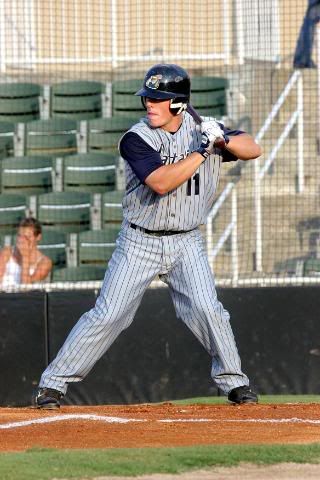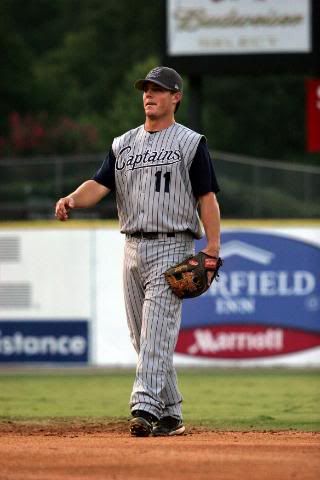 If at first you don't succeed, try another position.
If at first you don't succeed, try another position.
At least that is the case for Indians prospect Adam Davis. Davis is a 2006 third round draft pick out of the University of Florida who has played middle infield almost his entire baseball career. When he came into the system in 2006, at short-season Mahoning Valley he played 49 games at second base and 16 games at shortstop. Last year at Lake County he played 104 games at second base and 25 games at third base. This year he played second base and some outfield in Kinston.
But, seemingly out of nowhere, about a month ago Davis was told he was being converted to a catcher.
"It was just something the organization kind of came to me about and they told me their feelings about it," said Davis last week before a game in Lake County. "They asked me what I thought. I guess they had been considering it for awhile since I was drafted. Some of the higher ups came to an agreement on it, and they decided they wanted to make the move. They kind of put it in my hands and here I am today."
Where Davis is today is amazing considering a month ago at this time Davis had no clue how to catch. Prior to the switch Davis had never played the position before. Not even in Little League. Yet, the Indians saw something in him where they felt he could make the transition, and in the middle of the season to boot. Davis got the crashiest of crash courses where after just 11 days in extended spring training the last two weeks of May he was considered ready to go. He was assigned to Kinston on June 2nd to make his catching debut, did well, and now is the starting backstop in Lake County.
"I worked for about five days in Kinston with manager Chris Tremie," said Davis. "Just to kind of give me the ins and outs and catch some bullpens and things like that. I did a lot of basic drills with him. Then I went down to extended for 11 days to get my legs under me. I worked with [Tim] Laker the catching coordinator while I was down there. I caught two three inning games in a row, then a day off, then two games at six innings, then a day off, a nine inning game, a day off, then a nine inning game and then I was out of there. That was my first game experience ever, and then I was sent right back to Kinston and I caught four games there. It went pretty well."
Lake County manager Aaron Holbert relayed the thoughts of the organization, saying that so far things have gone really well.
"They sent him down there to extended for two weeks," said Holbert. "They said he was starting to really figure some things out and was starting to look like a natural back there. They sent him to Kinston for a few days, and then for the betterment of his development felt it best to come here to the SAL to face the less mature pitchers offensively when he is hitting. They thought it would be best for him to not really struggle offensively while he is learning a new position. The organization is happy about him."
This is not like switching from third base to first base, or from second base to shortstop. Those are similar positions where there are some differences, but not nearly the complete shock of a change that comes with moving behind the plate. This is a completely new game for Davis now with all the new responsibilities. Going from the middle infield to catcher flips the game completely around in many ways. Not only from it being a completely different position, but it is an entirely new viewpoint as well. All his life Davis has played in the field looking into the batter, but now as a catcher is looking out to the pitcher.
There is so much that a catcher does different than an infielder or outfielder. He essentially is the quarterback of the team where he calls the pitches and sets the defense. He is involved in every pitch. He has to be up to speed on the strengths and weaknesses of the hitters for the opposing team, and he has to know the strengths and weaknesses of all the pitchers on his staff as well. He has to block balls, control a running game, be a leader, and so on. There is no question the level of responsibility is much more heightened behind the plate.
"Obviously the hardest thing is blocking," said Davis. "I'm used to playing in the middle infield so I want to pick everything and do that. So, I guess that is something that can be taught. They feel some of the things they can't teach I already have. It is all about anticipating and things like that, which I have gotten a 100 times better at. I feel I am getting comfortable back there calling pitches and calling picks and just being involved in the game and all the little responsibilities a catcher has."
All of these changes at once can be hard to handle, but so far Davis has done well and looked very good. Whatever the Indians saw in him to make the change, it seems to have worked as he has flashed a lot of potential behind the plate.
"He looks good back there," said Holbert. "He has a strong arm. He moves around well. With him being a former infielder he is used to picking balls with his hands and now he has to focus on dropping to his knees and getting ready for that ball in the dirt compared to just trying to pick balls. That is one thing we are going to work on with him. He has had a few drops, but that is understandable. Catchers that have caught for 30 years drop balls. His quickness, his feet, his arm action, his times to second base are very promising. It is going to be a nice experiment."
Surprisingly, Davis has adapted well to the throwing part of the game. The Indians liked his arm a lot and felt it would translate well behind the plate. In his four games at Kinston that he started at catcher he threw out four of eight would be base-stealers, and in Lake County has continued to enjoy some success with his throwing.
"The throwing is something I excel at," said Davis. "A big reason for why they moved me was my throwing ability. That is something that has come pretty easily, and I have done pretty well with it so far with throwing guys out and things like that."
During Davis' transition to catcher, Indians minor league catching coordinator Tim Laker has been there almost every step of the way. Laker has helped Davis get the basics down, and the focus now is trying to get him to learn all the intricacies behind the plate. Things most catchers have learned over a long playing career that Davis is being forced to learn in a month.
"It is more or less just little things with Laker," said Davis. "Tinkering with things I am doing and work on everything. Try to watch some video and get some pointers and ideas from guys behind the plate who played in the big leagues. Trying to get in a routine with drills I do on a daily basis with receiving, blocking and throwing. There is not really one thing, just a bunch of tinkering with little things to bring everything together."
The Indians felt it best to start Davis' catching career in Lake County. The feeling was that while he is so immersed in learning all the aspects to catching that he would benefit going down a level and facing less advanced pitching so his offensive struggles don't carry over into his catching. Even though most of his focus is on those new catching responsibilities, he also is trying to make some adjustments at the plate as a hitter.
"The name of the game is consistency," said Davis who is hitting .201 with 5 HR and 19 RBI in 43 combined games at Kinston and Lake County. "Two years in a row I have not started very hot, but I have definitely gotten it going here the past few weeks. It is more or less me just sticking to my routine. I get away from that real easy when things go bad and I try searching for other things to get me back on track. That's kind of what I did in Kinston this year. Last year I developed a pretty solid routine and it got me ready for the game and that is kind of what I am getting back to now."
The move to catcher also greatly increases his value to the organization as he can play almost anywhere on the diamond. Coming into the season he had played third base, second base and shortstop in his short minor league career and at Kinston this year he played some outfield and handled it well. He very well could probably play any position on the diamond now, as his speed, toughness and athleticism could play well anywhere in a super utility role.
The organization is full speed ahead in trying to get Davis transitioned over to catching. They think that it would be good for his development and help him reach the major leagues more as a catcher more than as an infielder.
"Yeah, it suits me well the way I play the game," said Davis. "It is coming pretty naturally so far. I enjoy the responsibility calling pitches and things like that. I definitely like it so far."
Photos courtesy of Carl Kline














 Everything on this site is free, but for those interested in making any monetary contributions to help support the stability and growth of this site please click on the "Donate" button below.
Everything on this site is free, but for those interested in making any monetary contributions to help support the stability and growth of this site please click on the "Donate" button below.


0 comments:
Post a Comment